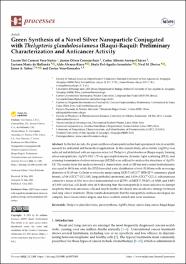Green Synthesis of a Novel Silver Nanoparticle Conjugated with Thelypteris glandulosolanosa (Raqui-Raqui): Preliminary Characterization and Anticancer Activity

View/
Download
(application/pdf: 1.618Mb)
(application/pdf: 1.618Mb)
Date
2022-06-21Author(s)
Vera-Nuñez, Lucero Del Carmen
Cornejo-Ruiz, Junior Oliver
Arenas-Chávez, Carlos Alberto
de Hollanda, Luciana Maria
Alvarez-Risco, Aldo
Del-Aguila-Arcentales, Shyla
Davies, Neal M.
Yáñez, Jaime A.
Vera-Gonzales, Corina
Metadata
Show full item recordAbstract
“In the last decade, the green synthesis of nanoparticles has had a prominent role in scientific
research for industrial and biomedical applications. In this current study, silver nitrate (AgNO3
) was
reduced and stabilized with an aqueous extract of Thelypteris glandulosolanosa (Raqui-raqui), forming
silver nanoparticles (AgNPs-RR). UV-vis spectrophotometry, dynamic light scattering (DLS), and
scanning transmission electron microscopy (STEM) were utilized to analyze the structures of AgNPsRR. The results from this analysis showed a characteristic peak at 420 nm and a mean hydrodynamic
size equal to 39.16 nm, while the STEM revealed a size distribution of 6.64–51.00 nm with an average
diameter of 31.45 nm. Cellular cytotoxicity assays using MCF-7 (ATCC® HTB-22™, mammary gland
breast), A549 (ATCC® CCL-185, lung epithelial carcinoma), and L929 (ATCC® CCL-1, subcutaneous
connective tissue of Mus musculus) demonstrated over 42.70% of MCF-7, 59.24% of A549, and 8.80%
of L929 cells had cell death after 48 h showing that this nanoparticle is more selective to disrupt
neoplastic than non-cancerous cells and may be further developed into an effective strategy for breast
and lung cancer treatment. These results demonstrate that the nanoparticle surfaces developed are
complex, have lower contact angles, and have excellent scratch and wear resistance.“
Subject
Collections
- SCOPUS [380]

